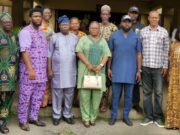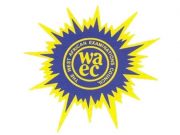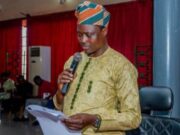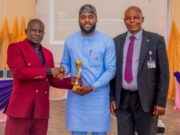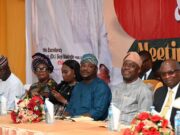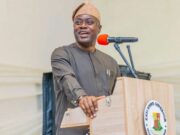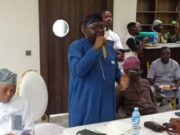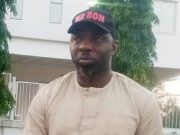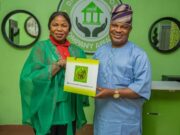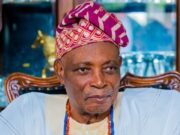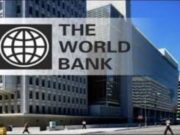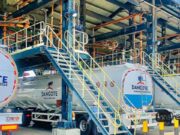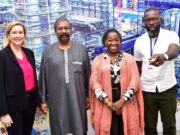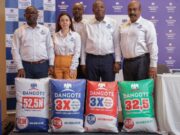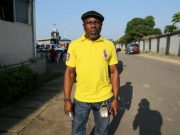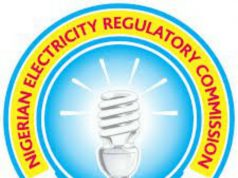Chief Adebayo Adelabu, the Minister of Power on Tuesday said the Federal Government was targeting the development of nearly four gigawatts of solar panel manufacturing capacity annually as part of ongoing efforts to domesticate Nigeria’s clean energy value chain and strengthen energy security.
Speaking at the Nigerian Renewable Energy Innovation Forum 2025 in Abuja, the minister said the administration of President Bola Tinubu was shifting focus from energy access to energy industrialisation by implementing the Nigerian First Policy, a strategy aimed at promoting homegrown production and innovation in renewable technologies.
He said, “Today’s forum is particularly significant because it highlights the role of innovation and domestic capability in achieving our renewable energy and energy transition goals.
“Through strategic partnerships being formalised here at NREIF 2025, Nigeria is on track to realise nearly 4 gigawatts per annum of solar manufacturing capacity.
“This commitment to domestic manufacturing and innovation is reinforced by the efforts of the Rural Electrification Agency, which continues to extend access to unserved communities, promote mini-grids and Distributed Renewable Energy, and nurture the ecosystem of private developers and financiers driving this transformation.
“Together, the ministry and the REA are shifting the national narrative — from energy access to energy industrialisation, and from deployment to local value creation.”
The Nigerian Renewable Energy Innovation Forum, convened by the Ministry of Power and the Rural Electrification Agency, serves as a national platform for stakeholders to develop strategies for renewable energy innovation, domestic manufacturing, and private sector financing.
This year’s edition, held in Abuja, attracted senior government officials, development partners, investors, and local manufacturers, all focused on deepening Nigeria’s participation in the global clean energy economy.
Adelabu described the forum, themed “Implementing the Nigeria First Policy: Facilitating Local Content Development and Manufacturing in the Renewable Energy Ecosystem,” as a turning point for the nation’s energy future, saying it reflected the government’s commitment to “policy, innovation, and investment convergence” to accelerate industrial transformation.
“NREIF 2025 isn’t just another event. It’s a declaration that Nigeria is ready to lead Africa’s renewable energy transformation. The Nigerian First Policy represents national pride, industrial competence, and long-term economic sustainability,” Adelabu said.
According to him, the initiative seeks to ensure that solar panels, batteries, and other clean energy technologies deployed across the country are “proudly made in Nigeria,” aligning with the Renewed Hope Agenda’s emphasis on homegrown innovation, local content, and industrial self-reliance.
Highlighting recent policy milestones, the minister said the enactment of the Electricity Act 2023 had decentralised the electricity market, with 15 states now possessing regulatory autonomy, and one having fully operationalised its own power market.
“We have broken the jinx of over-centralisation that crippled the sector for 60 years. With our large population, centralisation can never work. What we have now is liberalisation and competition,” Adelabu explained.
He added that the Integrated National Electricity Policy, approved by the Federal Executive Council in February 2025, would provide the first sector-wide framework in nearly two decades, harmonising existing reforms into a coherent roadmap for sustainable growth.
Adelabu disclosed that ongoing reforms had increased average power generation from 4,200 megawatts in 2023 to 5,300 megawatts in 2024, while grid stability had significantly improved, recording only one system disturbance this year.
He attributed the progress to the Presidential Power Initiative being executed in partnership with Siemens Energy, CMEG, and PowerChina, which aims to deliver an additional 7,000MW of operational capacity under its first phase.
“It took Nigeria 40 years to move generation from 2,000MW to 4,000MW. In less than two years, we’ve added 1,100MW, a clear signal that the sector is responding to reform,” he said.
The minister further disclosed that Tinubu had approved a N4tn bond to clear verified debts owed to generation and gas companies, while tariff reforms had boosted power sector revenue by 70 per cent to N1.7tn in 2024, with projections to exceed N2tn in 2025.
On metering, Adelabu announced that the Presidential Mid-Range Initiative would close Nigeria’s 7 million-meter deficit within five years.
He said N700bn had been secured from FAAC to deploy 1.1 million meters by the end of 2025 and two million annually over the next five years. This, he added, would complement the World Bank’s 3.2 million-meter programme and improve revenue assurance across the value chain.
The minister also confirmed the unbundling of the Transmission Company of Nigeria into the Transmission Service Provider and the Nigeria Independent System Operator, a structural reform he said would enhance market efficiency.
Adelabu noted that Nigeria had mobilised over $2bn in renewable energy funding through development finance institutions, including the World Bank’s $750m DIRES programme and Japan’s JICA $190m facility, positioning Nigeria as Africa’s largest mini-grid market.
He said the REA was playing a pivotal role in promoting off-grid electrification, mini-grid deployment, and private sector investment across underserved communities.
“We are no longer diagnosing the problems of the power sector. What we do now is execution, the practical implementation of solutions. With continued support, 24-hour electricity for Nigerians is no longer far away,” he added.
In his remarks, the Managing Director of the REA, Abba Aliu, said the agency was working to reverse Nigeria’s overdependence on imported solar equipment by driving investment into local manufacturing.
“We currently import most of our renewable energy equipment. That must change. NREIF connects policy ambition with market reality, linking research, financing, and innovation to build a Nigerian renewable future,” Aliu said.
He revealed that the agency expected to sign over $400 million worth of local manufacturing investment deals during the two-day forum, alongside expert panels and exhibitions showcasing new technologies.
Credit: punchng.com







